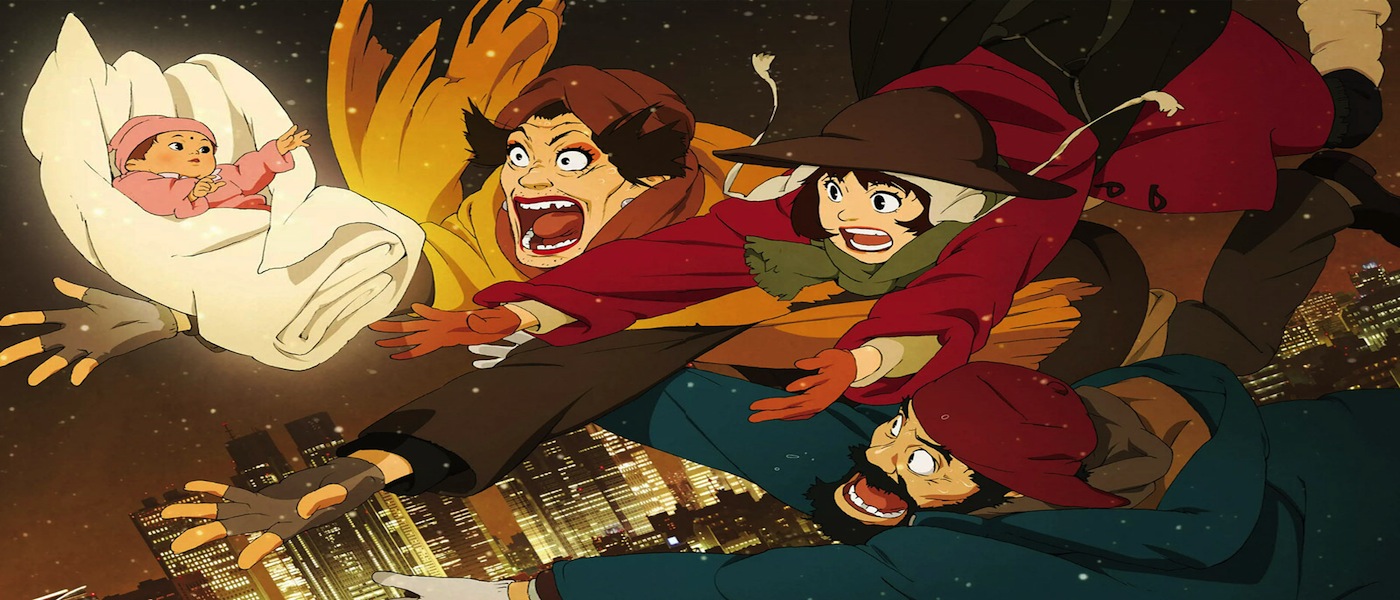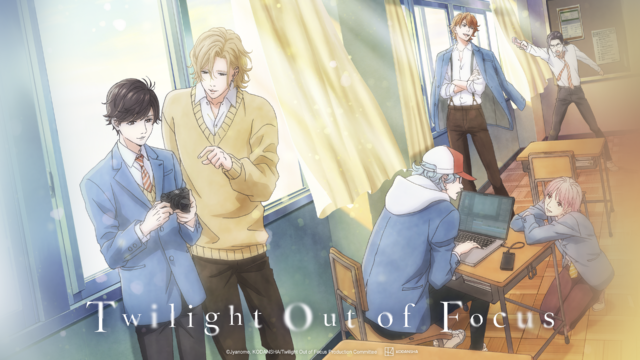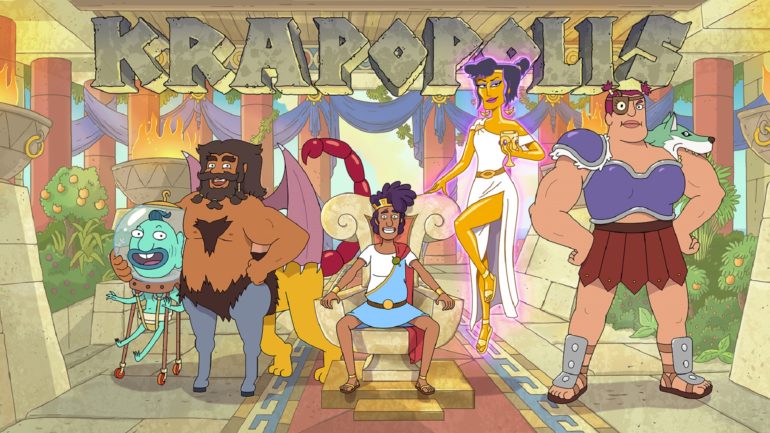English Dub Review: Tokyo Godfathers
Overview (Spoilers Below):
The lives of three unique homeless people become irrevocably changed one momentous Christmas Eve when the individuals discover a baby that’s been abandoned at the garbage dump. A sense of honor and justice sweeps over these three people as they take it upon themselves to not just keep this baby safe and show it that the world is full of love, but also try to solve the mystery of the infant’s missing parents and just how it came to be abandoned in the first place. As the three work together, they’re thrown into an unexpected journey as they learn more about themselves and society as a whole while they rush to give this baby a happy ending before the New Year. Tokyo Godfathers is the beautiful story of family, hope, and the interconnected overwhelming power of fate.
Our Take:
There are few filmmakers who are able to invade the mind and pry it apart as creatively and comprehensively as Satoshi Kon. Satoshi Kon is a prolific animation director, but his filmography remains limited due to his unfortunate early passing in 2010, but he still built a reputation of being a master of psychological mindfuckery with titles like Perfect Blue, Paprika, or the series Paranoia Agent. Tokyo Godfathers is certainly less of a mental brain twister than Satoshi Kon’s other films. In fact, this skews much closer to Millennium Actress than say Perfect Blue or Paprika, but it’s perhaps the most emotional and heartfelt out of the director’s oeuvre. Tokyo Godfathers is a story that’s still just as effective and emotional 17 years after it originally hit theaters. It’s a fundamental piece of Satoshi Kon’s filmography that has finally been done justice in America with this 4K restoration anniversary release courtesy of GKIDS.
Tokyo Godfathers’ greatest strengths lie in the human story that it tells that avoids going to fantastical places. It presents a narrative that’s all about giving salvation and peace to those that don’t have any, which in this case, primarily applies to the homeless. It feels significant that Tokyo Godfathers presents itself as a holiday story, especially considering how it atypically reframes the standard Christmas nativity narrative in a complex, new way. The whole Three Wise Men angle is not only not lost on anyone in this film, but it’s explicitly pushed in everyone’s faces. The point is that this should all feel intentional and that the cosmic powers of fate and the holidays have orchestrated this situation to happen to impart an important lesson.
Satoshi Kon’s twist on this classic setting feels like if Brett Easton Ellis or William Burroughs’ were doing a Christmas special. The characters are from the fringes of society and it helps the film tell this story about the marginalization of those without power, but how they can also be the most altruistic and empathetic people, with the holidays becoming an equalizer of sorts for everyone. It’s a rare time where these forgotten individuals feel like they’re partially seen. The film’s script is co-written by Keiko Nobumoto, most famously known as Cowboy Bebop’s head writer and the creator of Wolf’s Rain, which are two other works that impressively explore the dynamics of artificial pseudo-families.
Not enough can be said about the character work in this film. Miyuki, Hana, and Gin are some of the strongest characters to occupy any of Kon’s work and it’s remarkable how these rough around the edges individuals slowly grow on you as the film progresses. They initially seem like derelicts, but you’ll be crying over them by the time the end credits roll. This all stems from the remarkably authentic personalities that are crafted here and the types of individuals that find themselves shut out from society, such as a transgender person, and what that has to say about society.
The chemistry between these three is not only a consistent highlight through the film, but that’s essentially what the entire movie is. They do temporarily get separated, but their stories remain intertwined, even when they’re apart. The whole film is them reflecting on their separate meager, yet grateful lives and what the presence of this baby triggers in the each of them. It’s remarkably simple in that respect, but that works in the favor of Tokyo Godfathers. This really does feel like a holiday parable about kindness and appreciation and in that respect it doesn’t need to overcomplicate things. This is just a touching character study that provides three heart wrenching looks at humanity, what the world can do to people, and how those individuals respond accordingly.
Tokyo Godfathers tells such gripping stories that it feels like you could do an effective anthology series this way where each episode explores the different plight of someone who’s ended up in the same situation as Miyuki and company, whether they encounter this baby and it changes them for the better, or not. It’s about the celebration of life, regardless as to whether that’s a life that’s taken advantage of or one that’s “wasted.” This structure speaks to how competently and impressively Satoshi Kon crafts this story. It feels so natural that it’d be easy to watch a dozen more takes on this idea.
Since Kon does bring such emotion and entire lives of backstories to these characters there is absolutely no shortage of content here. It easily feels like the 90-minute film could keep going on, but the whole theme of Tokyo Godfathers is that “less is more,” and it pushes that mentality with its runtime and pacing. It’s a little remarkable that the group finds the orphaned baby five minutes into the movie and yet the characters already feel remarkably formed at that point. At the same time, while these characters may disagree over what’s best for this baby, none of them are necessarily wrong with their assessments. Everyone just carries their own respective baggage, which informs how they view the world. As this trio argues, the ironic thing is that at the core of these disagreements there is still three people who care about this baby.
A frequent metaphor that’s brought up in Tokyo Godfathers is that “there’s not much light in a cardboard box,” in reference to the humble lives that this trio of vagrants lead. Some people may argue that an infant would not be safe in the hands of some homeless people due to how little their have, but this film repeatedly emphasizes that material worth is much less valuable than the capacity for kindness. In the real world these three may be restricted to “cardboard boxes,” but their hearts know no limits. It’s a powerful, inspirational message, especially during the holidays.
Impressively, the film mostly just focuses on its three main characters with a slew of outrageous supporting players that come and go along the way. The strong focus that the film provides on its protagonists only allows them to further grow, but it’s interesting how the film posits the rest of the city as foils to them. They wind up on a crazy journey that sprawls into the wee hours of the night. Things progressively get out of hand as mafiosos, murder, and angels become the ingredients for the night. There’s a bit of an After Hours vibe as things continue to escalate out of control and characters just trust to follow the whims of the universe. However, as crazy as the story gets, it still remains grounded in its human center.

Tokyo Godfathers doesn’t get as trippy or surreal with its animation as something like Paprika and instead the glory is in the character models. The trio of the eponymous “Tokyo Godfathers” all move in distinct ways and their mouths in particular have such a style to them. MADHOUSE’s animation work here really captures the life behind these eccentric characters. Additionally, the film utilizes stunning, vibrant colors that nicely contrast to this somber story.
Tokyo Godfathers has always been an outlier from Kon’s career so it’s really nice to not only get a 4K restoration version of the film for its anniversary, but also a “new” dub. There was technically never an official dub for the film’s previous DVD release and the only technical copy of one aired on television in Japan and has since been one of those few pieces of media that gets lost to time.
Exceptional work was done with the re-release and re-dub for Kon’s Millennium Actress (as well as the re-release of Perfect Blue) and the work that GKIDS has done here is equally strong and respectful for Tokyo Godfathers. Again, it’s simply nice to have any dub for this film by this point and this will resolve many headaches for Satoshi Kon completionists out there, but it’s even better to see that there’s such thoughtful care put into the work of this dub and Kon’s masterpiece is treated with the respect that it deserves.
GKIDS reaches outside of their typical vocal stable for the film’s three leads. Victoria Grace voices Miyuki, Jon Avner is Gin, and Shakina Nayfack portrays Hana. All three of them are natural fits in these roles and they’re great opportunities for these performers. The film’s tiny supporting cast also features the likes of Kate Bornstein, Kirk Thornton, and Crispin Freeman (who’s always cited Hana as one of his dream roles, but at least he still gets to be involved in this production).
In the original version of Tokyo Godfathers there’s such an unscripted, spontaneous quality to the film’s dialogue and the conversations between Miyuki, Hana, and Gin. It really helps capture the slice of life aspect of the movie and thankfully the performances from the dub’s actors cultivate a similar energy. These feel like three characters who are all up in each other’s space and not three distinct individuals whose lines were all recorded separately.
GKIDS also deserves some respect for its casting of Shakina Nayfack in the role of Hana. The use of an actual transgender actress for the role of Hana is really wonderful and something that I was hoping would happen, but didn’t have my fingers crossed over. It shows that they really thought about this dub instead of just throwing a cast together and rolling something out for the sake of it. It sounds like every actor is a huge fan of the source material and is passionate about their characters. In the original Japanese version the character is just voiced by a man and the original release’s subtitles refer the character with masculine pronouns, which gives a very different interpretation and the works GKIDS has done here actually feels like it adds to the source material rather than being restricted by the past.
The film’s score may not be its focal point, but it’s still a very pleasant addition to the movie and adds to its beating heart. Keiichi Suzuki is in charge of the score and Moonriders handle the film’s title track. Suzuki’s accompaniments fluctuate between elegiac interludes to plunky music that feels like it’s from out of a carnival level of a Sonic the Hedgehog game (and this is meant as the most extreme of compliments).
The final act of Tokyo Godfathers does spiral towards unexpected tragedy, but even through the gloom Tokyo Godfathers maintains its optimistic point of view and tries to shine brightly for the future. It’s a morose ending that’s full of pain, but it juxtaposes the sorrow with compassion and wonder to create something really special and cathartic. The final minutes are pure magic and it really does feel like an angel has carefully orchestrated the entire events of the night to help make some miracles happen for the holidays. It’s a beautiful idea that the characters would probably really appreciate.
GKIDS re-release of Tokyo Godfathers is as good as it gets. It’s very satisfying to see that this underdog from Satoshi Kon’s resume is finally able to get some appreciation thrown its way. For longtime fans of the movie, this long overdue dub is well worth the wait. Tokyo Godfathers may not rise to the same cultural phenomenon ranks as Perfect Blue, but this very faithful 4K release will help Tokyo Godfathers rise in popularity and not be such an obscure gem from the past.
‘Tokyo Godfathers’ receives a limited release courtesy of GKIDS on March 11th (dubbed)



























I hope this turns out to be another Gravity Falls-type show with an overarching storyline.